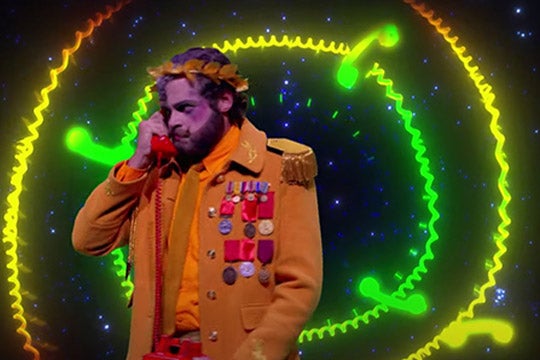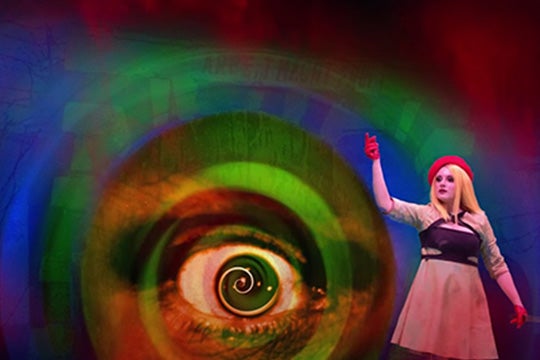
Stage and Screen
Rice Opera’s first virtual opera combines recorded musical performances, green screen backgrounds and lots of ingenuity to tell a story of resistance.
By Amy McCaig
The Shepherd School’s Opera Department and Chamber Orchestra presented their first virtual opera, “Der Kaiser von Atlantis,” (“The Emperor of Atlantis”) Oct. 29 and 30. The only opera written by Viktor Ullmann, “Der Kaiser,” was completed in 1943 and includes a libretto by Jewish poet Peter Kien. It is a prime example of the musical resistance that took place in Czechoslovakia’s Theresienstadt Ghetto during World War II.

“It was important to me during these extreme circumstances to create a project that would be meaningful, carry musical significance and be emotionally poignant at the same time for my students,” said Miah Im, the new director of opera studies at the Shepherd School. Pat Diamond provided stage direction, and the orchestra was conducted by Jerry Hou.
The one-act opera, sung in German, includes seven performers and begins by introducing Death/Der Tod (Peter Morgan, bass-baritone), portrayed as an old soldier proud of his dignified work. He meets the Kaiser Overall (Luke Sutliff, baritone), who declares war and commands Death to fulfill his work without considering what Death has to say about the plans. Death is outraged and resigns from his role.
“Its very existence is a testament to the resilience of the human spirit,” Im said.
Soon, even the most gravely wounded and critically ill are denied Death’s relief. At long last, Death appears to the disturbed Emperor Overall and demands his life as the price of taking up his role again. The moral of the opera, which is revealed at the end in the Bach-like chorale, is that death should never be taken in vain, Im said.
Although the opera was rehearsed in Theresienstadt in 1944, it was never performed there. Ullmann and Kien were ultimately sent to Auschwitz, where both died. However, Ullmann ensured the opera’s survival by secretly giving it to Theresienstadt’s librarian, Emil Utitz, for safe keeping, who passed it along to another survivor of the camp. Thirty years later, its world premiere was performed by the Dutch National Opera in Amsterdam in 1975.

“Its very existence is a testament to the resilience of the human spirit,” Im said.
o further enhance viewers’ experience, Im conceived the idea of using a 24-by-62-foot green screen onstage in the Lucian and Nancy Morrison Theater and a process known as Chromadepth to produce 3D-like effects for the backdrops. The effects can be viewed with simple prism 3D glasses, although the opera can be enjoyed without them, Im said.
“I have incredible students who are willing to put in the hard work,” said Im. The other five cast members included Jonathan Rhodes, tenor, as Harlekin; Dylan Gregg, bass-baritone, as Der Lautsprecher; Joshua Berg, tenor, as Ein Soldat; Kresley Figueroa, soprano, as Bubikopf; and Shannon Keegan, mezzo-soprano, as Der Trommler.
To watch the full opera production, click here.
